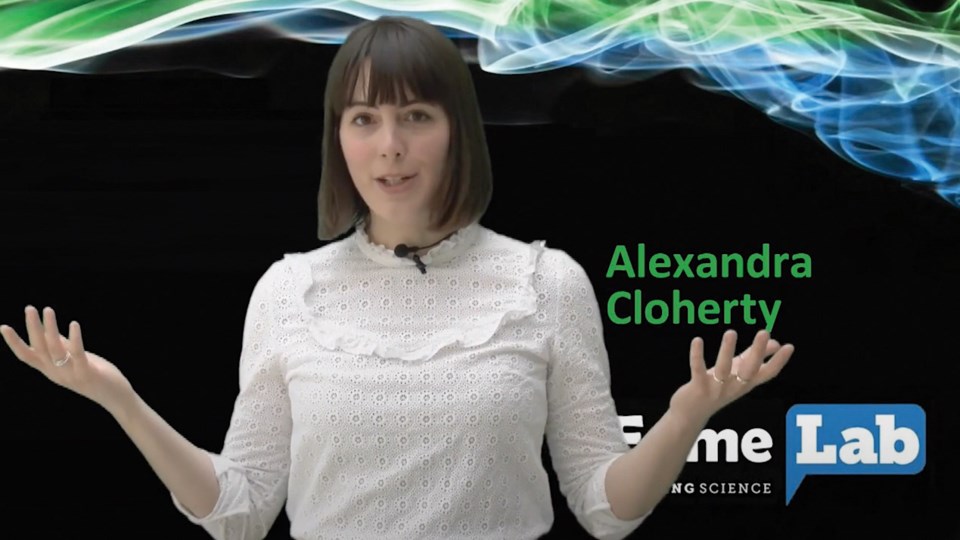At the top of her award-winning pitch, Elphinstone grad Alex Cloherty admits during COVID-19 lockdown she felt the weight of all the stuff she was locked down with, so she started getting rid of what she didn’t need and rearranged her home into something cozier.
Now here comes the twist: “I’m not the only one who deals with viruses by decluttering,” said Cloherty. “It turns out, every single cell in you can do the same.”
Enter autophagy, “self-devouring” in Ancient Greek – a system that allows for the removal of clutter within cells.
It’s the focus of Cloherty’s PhD research at Amsterdam University Medical Center (UMC) and of a three-minute talk she recorded that gave her a first-place finish in the Netherlands, securing her a spot at the FameLab International Final in November.
FameLab is an international science communication competition organized by the British Council and owned by the Cheltenham Science Festival.
Last year scientists from 20 countries delivered three-minute presentations on topics in science, technology, engineering and mathematics for the juried competition, which aims to “find and support the world’s most talented new science communicators.”
Cloherty’s winning presentation for the Netherlands focused on her research into whether it’s possible to direct cells to “declutter” viruses, specifically HIV, to prevent, treat and eventually cure it.
Her interest in science communications grew in high school where she tutored her little sister’s friends. After graduating in 2011, she took on tutoring at UBC during her undergrad and has been authoring a blog called Microbial Mondays since she started graduate school.
“This kind of felt like some sort of achievement after spending so much time trying to train myself to do science communication,” said Cloherty of the win.
The jury highlighted her enthusiasm about the topic and ability to answer questions following the talk.
In the lead up to the November competition, Cloherty has to prepare two more presentations and will be receiving additional training, including in front of a camera.
During the COVID-19 pandemic, Cloherty has been following public health communications in both Canada and the Netherlands.
“Whenever I’ve been frustrated with what I see is when people try to dumb it down too much,” she said, adding the challenge also comes when politics and science collide, as has appeared to have happened with advice around wearing masks.
Another tip she’s learned is the importance of sticking to one message. “It’s a tricky line to step along, not to reduce the quality of information, but … trying to give all the important ideas,” she said.
Cloherty, who is heading into her fourth year in September, said her team at Amsterdam UMC is getting closer to completing work looking into how COVID-19 gets into the body and how autophagy could be used to treat it – a research topic her team pivoted to last year.
They’re also looking at different models for studying viruses using leftover human tissues after surgeries, something Cloherty developed initially to examine how HIV gets into the body.
On the strictly science side of her work, Cloherty said “it’s been amazing” to watch vaccines and treatments develop as her team works on the virus.
“I remember in my master’s program I had lectures on how mRNA vaccines would be the next big thing,” she said, adding work was already underway on their applicability in an influenza pandemic.
“They were already predicting what would be the next big problem for us back then, four years ago.”
But mostly, she’s been amazed with how quickly the public has gained knowledge about viruses and vaccines. “I wish it could have happened in another way, but it’s been super interesting to see. What a time to be training as a science communicator and a virologist. It’s been really interesting to be in the middle of it.”
The pitch can be watched on the Eindhoven University of Technology YouTube channel at: youtu.be/ngMWsLPH7Ek



